Killer Coke Update | November 6, 2007
Day of Action, College Updates, Colombia, India, Mexico, & Norway
Contents of the Newsletter
- Campus Updates
- November 8 Day of Action from United Students Against Sweatshops
- Brown University, Rhode Island
- College of Wooster, Ohio
- Earlham College, Indiana
- Loyola University, Chicago, Illinois
- State University of New York
- University of Colorado
- University of Michigan
- University of Saskatchewan
- University of Vermont
- Vassar College, New York
- Press Release from University of Bath
- Major Stories Regarding Multinationals & Paramilitary Death Squads in Colombia
- Collection of essays on "The Coke Complex"
- Campaign Calls on Norway's Government Pension Fund to divest from The Coca-Cola Co., Coca-Cola Enterprises and FEMSA.
- India and Mexico
- Aspartame
- New Zealand Petition on Aspartame
- Coke Recognized as Bad Corporation Worldwide
- Bottled Water vs. Tap Water: Take the Pledge
- Major reports from the campaign that are useful in organizing
- Do you need a customized Campaign leaflet?
- Campaign's 'Campus Activism' Section
- Take Actions Against Coke!
- Please send photos, reports of events, etc. for the Campaign website
a. November 8 Day of Action from United Students Against Sweatshops:
"On Thursday, November 8, students at high schools and universities throughout the US and Canada will be participating in a day of action against Coke. Groups will be holding rallies, die-ins, funeral processions, public debates, and a bunch of other actions to get their universities to cut their contracts with Coke. If your school is working on a Coke campaign, or is interested in getting started, this would be a great time to hold a public event.
If your group is planning anything, or you would just like more information, then please send me back an email at zack@usasnet.org and let me know what you are up to.
A later email:
"We now have 15 schools (see list below) who have committed to participating in the Day of Action. We will be having die-ins, rallies, funeral processions, teach-ins, street theater, and all other kinds of cool actions. So, if your group is planning on participating, or if you just want more information, then send me an email at zack@usasnet.org.
Schools committed to the Day of Action
- Clark University
- Earlham College
- Florida International
- Indiana University
- Loyola Chicago
- McMaster
- Queens University
- SUNY Albany
- SUNY Binghamton
- SUNY Stony Brook
- University of California, Berkeley
- University of Guelph
- University of Michigan
- University of Vermont
- Vassar College
b. Brown University, Rhode Island
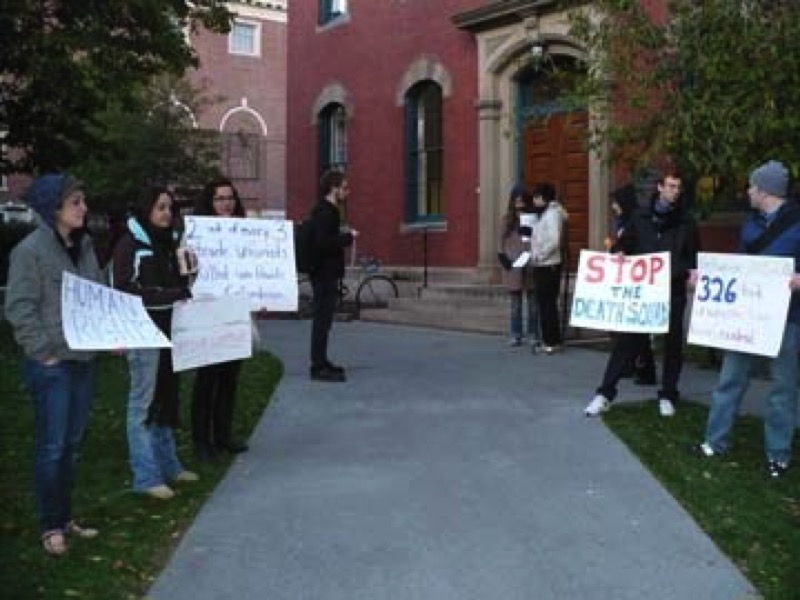
We have been contacted by students at Brown University wanting to support the Campaign to Stop Killer Coke. They planned the demonstration described in the article below which brings attention to the horrible crimes committed by the Colombian government and paramilitaries which are closely allied with multinational corporations like Coca -Cola.

The Brown Daily Herald, "Protesters greet Colombian Ambassador Barco," By Leslie Primack, November 2, 2007
Read Article
"Protest organizer Jake Hess GS asked Barco why peace activists are repeatedly killed by so-called 'self-defense' organizations. Hess and other demonstrators were protesting human rights violations perpetrated by Uribe's government.
"In an interview with The Herald, Hess said the United States' uncritical support for Uribe's administration, despite flagrant human rights violations, reflects unease over the recent leftward shift of Latin American countries such as Venezuela, Ecuador and Bolivia. He cited Human Rights Watch's characterization of paramilitary groups as an extension of the government's armed forces.
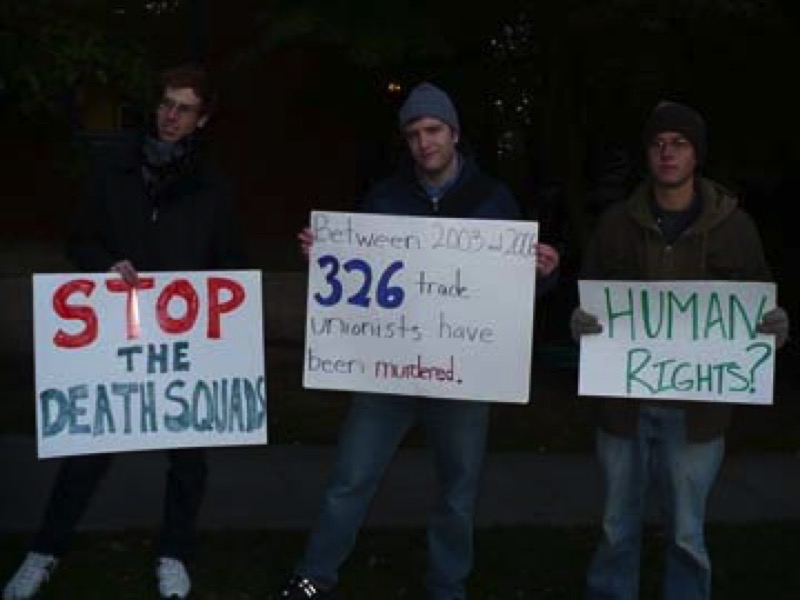
"According to Human Rights Watch, 14 congressmen from Uribe's administration are under arrest for ties to drug-trafficking paramilitary organizations, and more - 30 in total, according to Barco - are currently under investigation. Yet Barco said the perception of Colombia as politically corrupt is misguided. The current administration, she said, is weeding out criminal politicians who were in office long before Uribe was elected, and that he is working to make politics 'clean and transparent.'
"Still, Yesenia Barragan '08, another protest organizer, said 'the distinction between government officials, paramilitaries ... and guerrillas is very blurred. The group of students (protesting) is highlighting the really quite baffling labor rights violations of the Colombian government,' Barragan said. An American citizen of Colombian and Ecuadorian descent, Barragan said the situation in Colombia hits home given her family connections to the country and broader region. Her aunt is a South American trade union activist and her distant relative was murdered while working as a journalist."
The Wooster Coalition to Ban killer Coke is planning two activities for the month of November. At the beginning of the month there will be an ice cream social which will be an informal gathering in order to inform the campus community about the issues surrounding Killer Coke. Near the end of the month there will also be a forum with both professors and students to discuss the issue of banning Coca-Cola products from campus.
Here's an update on Earlham College's campaign to Kick Coke:
The college's Vendor Relations Committee has been tasked with reviewing Coke's status on campus. The VRC sent a letter to Coca-Cola about two weeks ago informing Coke that Earlham may stop selling their products if they don't address specific concerns about union suppression in Colombia/environmental problems in India. So far we're still waiting for a response from Coke.
So far the campaign has been largely focused around these administrative concerns this semester, but we are stepping up our student awareness campaign as well. For the Nov. 8th day of action we're going to host an alternative beverage party, and we're making our "mascot" this weekend!
That's the news from Earlham...we'll be sure to send along pictures from the Nov. 8th events.
e. Loyola University, Chicago, Illinois
Loyola University Chicago's contract with its provider of beverage services, Coca-Cola, is set to expire on July 31, 2008. A committee of staff members from various departments is reviewing proposals submitted by Coca-Cola and other beverage service companies. There has been an open debate on our campus related to Coca-Cola's alleged human-rights violations in developing nations.
A resolution passed by the Unified Student Government Association (USGA) on October 23, 2007, asks that the committee delay its decision so that University-wide educational efforts can continue and interested parties can offer more input to the selection committee. This request has been granted. The committee will extend the timeline for discussions and presentations highlighting both sides of this important issue. The original deadline for a final recommendation was October 29, 2007. It will now be extended to November 16, 2007.
Loyola University Chicago Unified Student Government Association Resolution calling for an end to the Coca-Cola contract at the university (Resolution was passed on October 23, 2007.)
Read Resolution and Letter
"We, the Unified Student Government Association, also hear and convey the student call to not renew the beverage contract with Coca-Cola, based on the documented human rights violations at their bottling plants and their failure to comply with requests for independent investigations. When students actively and intelligently express their wishes to the administration, they deserve to have these imperatives met because they are the group directly impacted by the administration's choices."
The Phoenix, (Loyola University, Chicago), "No Coke on campus, please: Letter to the President [of Loyola]," October 3, 2007
Read Letter
"...I have recently returned from Colombia and have become aware of human rights violations facing many union activists in this country. In saying this, I would like to call to attention the justice implications of the Coca-Cola products sold on both Water Tower and Lake Shore campuses."
f. State University of New York
Pipe Dream (Binghamton University), "Anti-Coca-Cola group mobilizes at BU," By Marina Gaft, October 19, 2007
Read Article
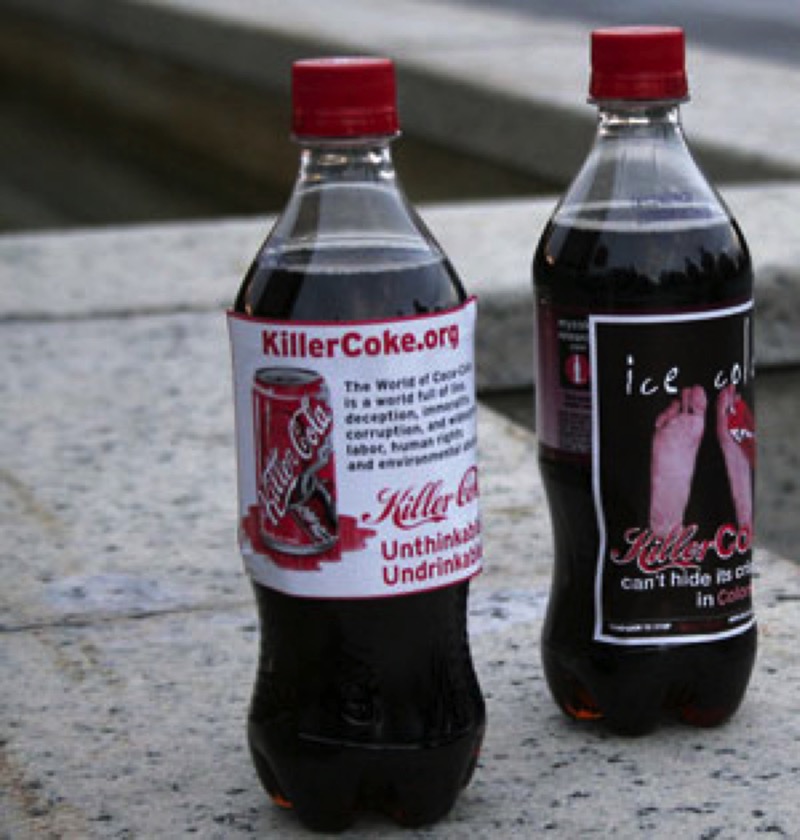
Photo by Jessica Jakoby
"A growing movement on campus is calling for Binghamton University to cancel its contract with Coca-Cola and for the company to be kicked off campus for good. In recent weeks students across campus have been passing out Killer Coke fliers, detailing crimes committed by the company in its Colombian bottling plants."
Read Article
"Wednesday, October 17, 2007 (Stony Brook) - Members of the Graduate Student Employees Union (Stony Brook) successfully advocated for a motion of the Graduate Student Organization (GSO) Senate to ban Coca Cola from its meetings joining GSEU and United University Professions, the faculty/staff union at Stony Brook, the GSO Senate as the third representative body to ban Coca Cola from their meetings at Stony Brook University."
the stony brook Statesman, "New Tactics by The Coke Campaign: Phone Calls To Administration Begin," By Adam Peck, October 8, 2007
Read Article
"The campus campaign against Coca Cola has begun a new tactic that has proven to be successful on other college campuses. On Wednesday Oct. 3, the Social Justice Alliance lined the walkway between the Student Activities Center and the zebra path and encouraged students to call the office of the president directly and demand that Coca Cola be kicked off campus. Campaign leader Anita Halasz estimated that roughly 20 students called on the spot and several more people called after the event took place."
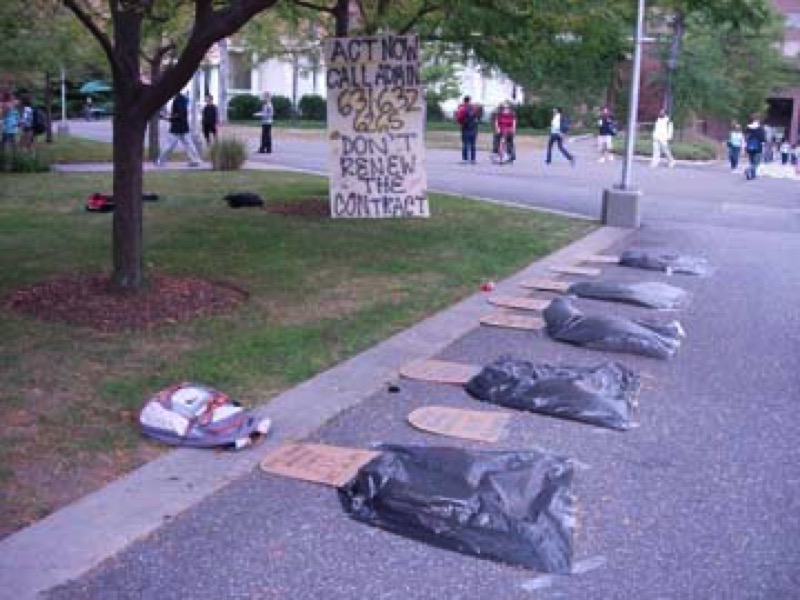
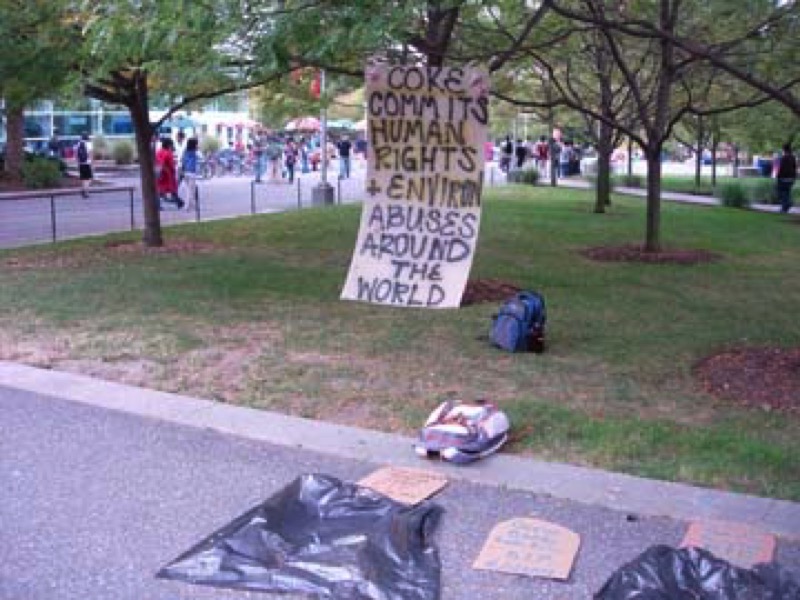
I'm a student at the University of Colorado, Boulder, and I'm also a member of the Amnesty International chapter at the school. Our group is getting ready to start a campaign to get Coke off of our campus. In the upcoming weeks, we are going to start publicity and coalition building with other student groups. We are also planning to have some events in the upcoming year to educate the student body. Thank you for the posters and literature you sent us. We are scheduling a major event early next semester and look forward to Ray Rogers' visit.
Flyer/Petition for U-M Campus can be found on the website of The University of Michigan Stop Killer Coke Coalition at www.killercoke.org/umich.
An organizing committee at U-M, the Coke Coalition, has been established. Its goal is to hold U-M Chief Financial Officer Tim Slottow and the administration accountable and to again kick Coke off campus. The U-M Organizing Committee is asking students, faculty, staff, unions and others at the University of Michigan to email them at umcokecoalition@gmail.com if they are interested in helping in the Campaign. In addition, any one receiving this newsletter who has friends or contacts at U-M who would like to help the campaign are asked to have them contact the committee.
The committee will be distributing thousands of petitions throughout the campus to educate the community about widespread labor, human rights and environmental abuses by Coke. They will need help in distributing and collecting signatures on these petitions.
The petition petition can also be downloaded, signed and dropped off at the addresses at the bottom of the petition. Supporters can email the link to friends who can also sign it.
The Michigan Daily, Letter to the Editor: Coca-Cola's injustices still exist; contracts should be cut again," Clara Hardie, October 8, 2007
To the Daily:
Yet another act of violent union oppression has occurred at the behest of The Coca-Cola Company. The University continues to do business with a company that consistently violates its own ethical Vendor Code of Conduct. The University followed New York University and others in kicking Coke products off campus in 2006 after a three-year long student campaign, but it reinstated the contract four months later. More than 45 schools worldwide have cut contracts with Coke for its environmental and human rights abuses, according to Corporate Campaign of New York.
A human rights injustice happened on Sept. 27 when the college-aged son of a Coke worker and union activist in Colombia was thrown into a van and beaten by paramilitaries. The kidnappers were likely directed by anti-union Coke bottling plant managers. They told him to give his father the message, "We won't rest until we see you cut into pieces." This was reported by Colombian food industry trade union president, Javier Correa, who wrote to activists all over the world. Correa spoke at a Michigan Student Assembly meeting in 2004. He recalled the nine murders, frequent death threats, kidnappings and beatings of trade union members by Coke's death squads. Subsequently, MSA passed a resolution to support the actions of the Coalition to Cut Contracts with Coca-Cola, a group comprised of more than 5,000 students from more than 22 student groups.
University administrators Peggy Norgren, Dan Sharphorn and Timothy Slottow renewed the Coke contract behind students' backs in the spring of 2006. They had cut contracts four months earlier when the company failed to agree to investigations by independent monitoring groups in Colombia and India. No results of any investigations have been reported, despite the University's renewal of the contract.
The administration must face its mistake, revoke its contracts with Coca-Cola once again and enforce its own moral policies.
Clara Hardie
Alum
The letter writer is a former member of the Coalition to Cut Contracts with Coca-Cola.
i. University of Saskatchewan, Canada
Lots of activity has been happening at the University of Saskatchewan to educate the community about Coca-Cola's crimes and misconduct and to bring an end to the monopoly stranglehold Coke has on the university. Over the past six weeks, students have been targeting specific buildings and areas of this large campus handing out flyers and hanging posters everywhere — on bathroom doors, bulletin boards, by water fountains and on classroom lecture podiums. They are using Campaign to Stop Killer Coke flyers and posters and are creating their own focusing on various themes that are of major concerns to different audiences from health to human rights.
Groups concerned with social justice, health and environmental issues attended a big town meeting. Television news features describing Coke's labor and human rights abuses in Colombia were shown. The consensus of the many participants was: We don't need Coke's dirty money!
An update from University of Vermont:
On October 24th, the Coalition for Responsible Coca-Cola held a outside event for Pop the can, an anti-coke mascot touring from campus to campus at the University of Vermont. Pop was out on display while members of the group explained to people passing by the crimes Pop has witnessed from the Coca-Cola's factories across the globe from murders in Colombia to stealing groundwater in India. The event, although small, gained a good amount of attention from students and faculty and gained more support for this campaign. Coalition for Responsible Coca-Cola also had three cut-outs set up around campus, representing a paramilitary soldier, an assassinated Coke worker, and a pair of Indian children with each having signs dictating Coca-Cola's crimes they had been affected with as well as having information people could tear off to keep.
Kick Coke Campaign published a four page newsletter about their campaign against The Coca-Cola Co. It includes the following articles:
1. People Before Brand Loyalty: Remove Coca-Cola from Vassar Now!
- Labor Abuses in Colombia
- Environmental Abuses in India and Elsewhere
- Other Abuses by Coca-Cola
Kick Coke Campaign, Vassar College, October 2007
Read Newsletter
l. Press Release from University of Bath, "'US universities disturbingly over-commercialized' says new book," By University of Bath, September 27, 2007
Read Article
Universities and colleges in the United States have become "disturbingly" commercialised, according to a new analysis edited by an academic at the University of Bath, UK. Higher Education: Open for Business, edited by Christian Gilde, says that commerce has become too closely involved in academic research, classroom activities and college sports. In his introduction to the work, which has nine papers from eight authors, Mr Gilde, of the Marketing Group in the University's School of Management, says: "Some campuses seem to have abandoned ethical standard in the quest for corporate dollars.
"It is disturbing to see that today's cafeteria conversation do not center around topics such as Shakespeare or international affairs. Due to the overcommercialization of higher education, college and university students sadly start paying attention to issues such as the following: are we a Gateway or a Dell campus" Are we a Coca-Cola or a Pepsi campus" Are we a Nike or an Adidas campus""
Mr Gilde said that "commercialism has gotten too close to certain aspects of academia" and he believed this was a "dangerous development". "If universities morph, more and more, from knowledge seekers into profit seekers, we are faced with a development that will change the landscape of higher education."
2. Major Stories Regarding Multinationals and Paramilitary Death Squads in Colombia
a. USA Today, "Murder and payoffs taint business in Colombia," By David J. Lynch, October 30, 2007
Read Article
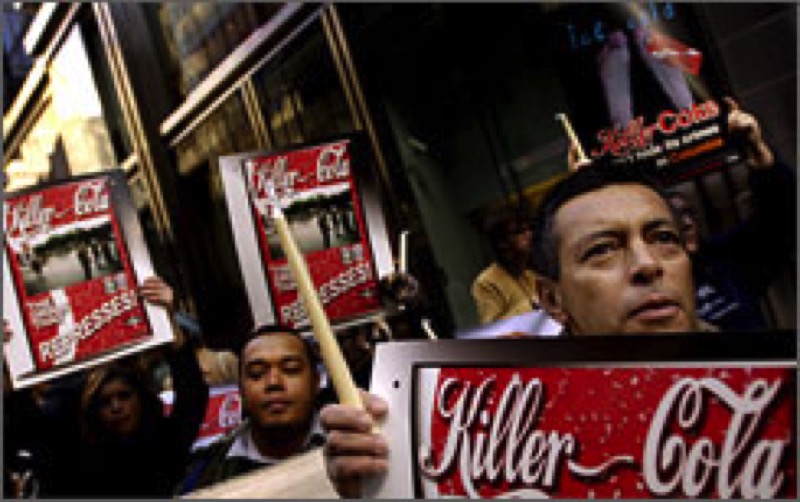
Colombian labor organizer Luis Cardona, protests
in New York in 2005. Protesters alleged that
Coca-Cola hired paramilitary death squads to
terrorize labor leaders in Colombia.
"A 'Killer Coke' campaign by activists aims to drive Coca-Cola (KO) off U.S. college campuses over the killings of union leaders at four of its bottling plants in Colombia. Since April 2003, 45 campuses, including Rutgers University and Smith College, have switched from Coke, says Ray Rogers, the veteran labor strategist who leads the campaign."
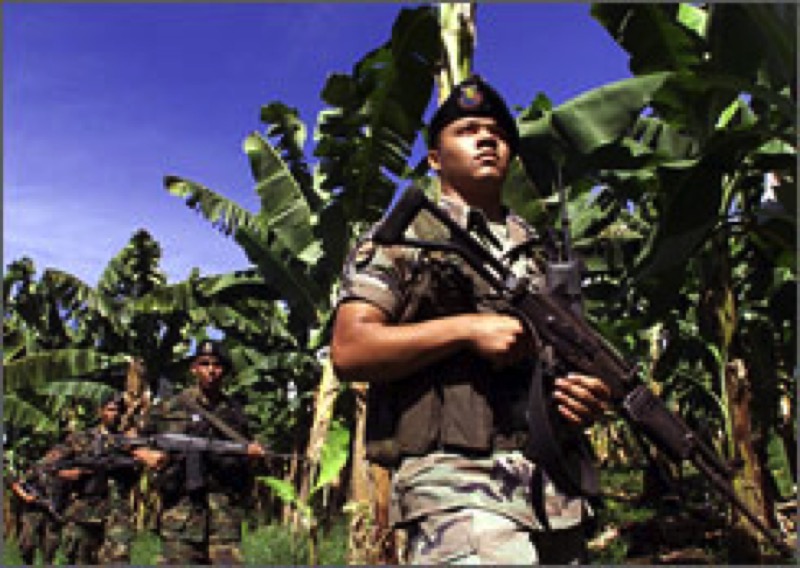
b. Conde Nast Portfolio, "The Banana War," by Kevin Gray, October 2007
Read Article
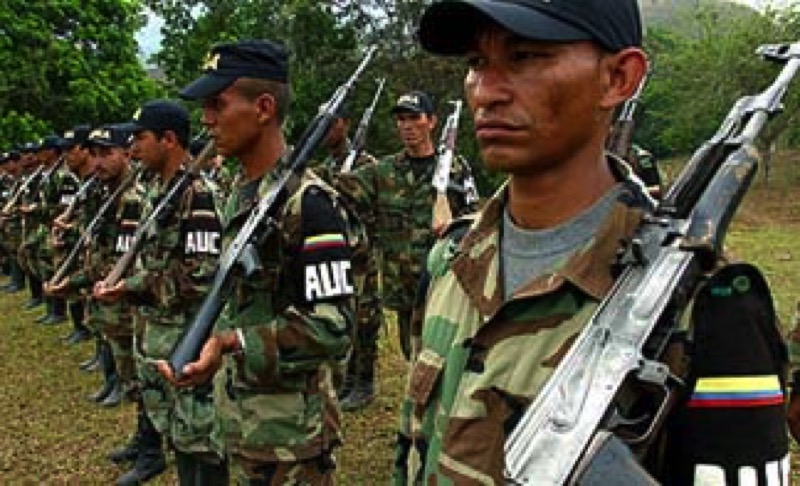
Photograph by Scott Dalton
"In Colombia, multinational companies' ties with the A.U.C. are part of an ongoing investigation that is gripping that country as intensely as Watergate did the U.S. The links between Colombia's political and military elite and the paramilitary group have so far led to the arrest of more than a dozen current and former Colombian congressmen-and now those connections are threatening to bring down the government of President Alvaro Uribe, the United States' closest ally in South America.
"The widening scandal may engulf other U.S. firms doing business in Colombia. Two jailed leaders of the A.U.C. (which agreed to disband last year) have testified in Colombian courts that many multinational corporations operating in Colombia paid them off. Congressman Bill Delahunt, a Democrat from Massachusetts who is leading a House subcommittee investigation, told me he plans to call the Coca-Cola Co., Nestl, Occidental Petroleum, and Drummond (an Alabama mining outfit), among others, into congressional hearings to explore accusations that they or their business partners also funded the A.U.C. or other groups."
3. Collection of essays on "The Coke Complex: The Journal of Cultural Anthropology announces publication of a cluster of essays on the "Coke Complex," put together following an endorsement by the American Anthropological Association and the Society for Cultural Anthropology of boycott actions against The Coca-Cola Company.
The Journal of Cultural Anthropology, Society for Cultural Anthropology, November 2007 (Volume 22, Number 4)
Read Articles in Cultural Anthropology
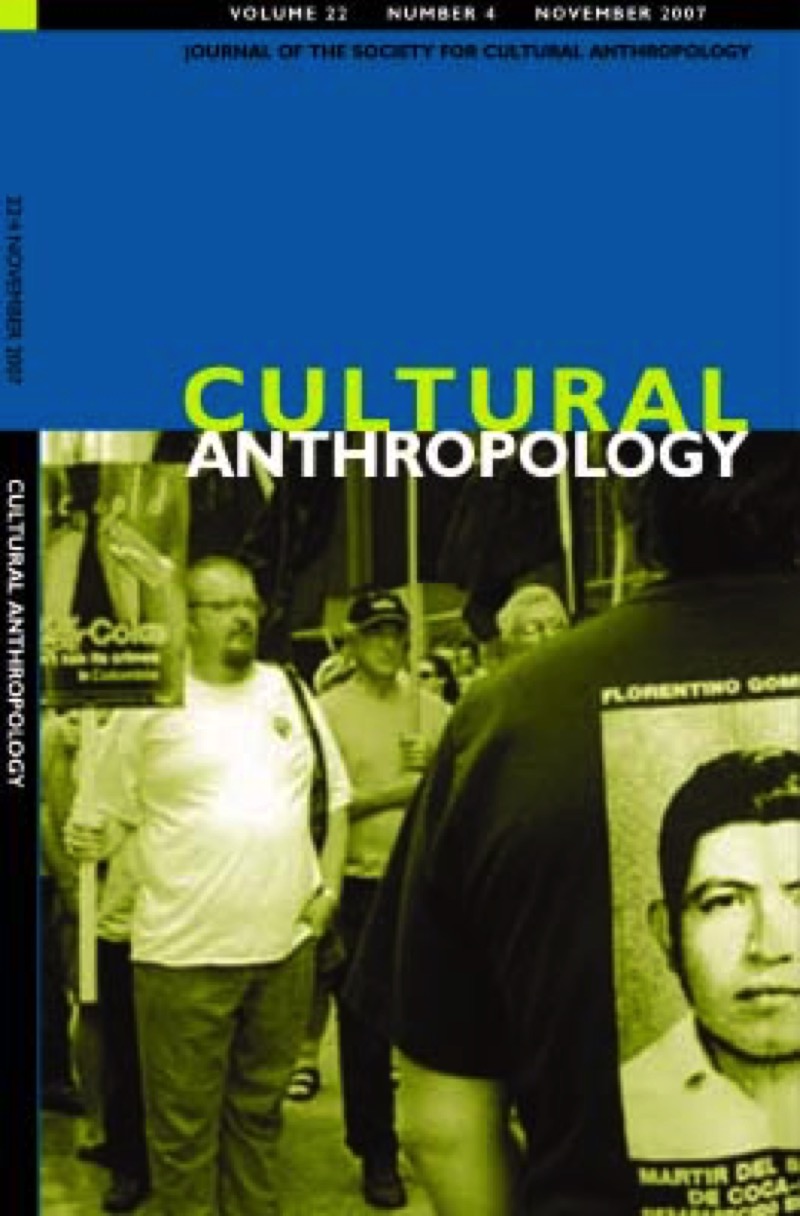
In spring 2006, the American Anthropological Association and a number of its sections, including the Society for Cultural Anthropology (SCA) and the American Ethnological Society, endorsed boycott actions against The Coca-Cola Company (see SavageMinds.org). The endorsement was based on a growing anthropological record of problems associated with The Coca-Cola Company. The editors of SCA's journal, Cultural Anthropology then issued a call for papers that addressed various aspects of what they had come to think of as "the Coke Complex" - the multiplicity of examples, practices, organizational forms and political economic dynamics that enable and index The Coca-Cola Company and the so-called "New Economy" in which Coca-Cola now operates. Their goal was to collect a set of diverse essays - not necessarily focused on The Coca-Cola Company itself - that could leverage anthropological insight in helping readers understand the many different ways that The Coca-Cola Company, the global beverage industry and the global economy writ large "work," often with unjust and environmentally unsustainable effects. This collection of essays on "The Coke Complex" is now available, in the November 2007 issue (Volume 22, Number 4) of Cultural Anthropology.
Drawing on rich ethnographic and historical material, the essays move from Mexico to India, from the U.S. to New Guinea and Fiji, examining the business and cultural practices of the global beverage industry. Each essay untangles multiple connections - between struggles over water rights, cultures of consumption, and new political strategies of activist and non-governmental organizations, for example - that demonstrate how Coca-Cola, the global beverage industry, and the global economy writ large work, often with unjust and environmentally unsustainable effects.
4. Campaign Calls on Norway's Government Pension Fund to divest from The Coca-Cola Co., Coca-Cola Enterprises and FEMSA. Read letter from Ray Rogers to Henrik Syse who heads the Corporate Governance Dept.
According to a May 4, 2007 article in The New York Times, entited "Norway Backs Its Ethics With Its Cash": "Norway has amassed a fortune of more than $300 billion over the last decade, thanks to its profits from oil exports … So rather than managing their monstrous nest egg simply for the best returns, the reluctant billionaires of Norway are using the money to advance an ambitious ethical code they established in 2004 for their oil reserve, known as the Government Pension Fund…"
The Fund has divested from companies producing cluster bombs and nuclear weapons and related components. In June 2006, the Fund "added Wal-Mart Stores to its blacklist, alleging that the retailer was guilty of tolerating child-labor violations by its suppliers in the developing world and obstructing unions at home. The fund sold off more than $400 million worth of Wal-Mart shares."
The Fund that can only invest in companies outside of Norway, according to The New York Times, has half its holdings in Europe and about 30 percent in the United States. "The grounds for exclusion fall into five categories: serious or systematic human rights violations; serious violations of individual rights in war and conflict; severe environmental damage; gross corruption; and other serious violations of fundamental ethical norms."
The Campaign is looking for student groups, labor unions, political leaders and others in Norway to encourage the Norway Government Pension Fund to divest of its Coca-Cola holdings. Please contact info@KillerCoke.org or 1-718-852-2808.
a. India
India Resource Center, "Community Files Police Report Accusing Coca-Cola of Water Theft and Pollution, " October 25, 2007
Read Press Release
"Over 600 people marched and rallied against the Coca-Cola bottling plant in the village of Sinhachawar in Ballia district in India yesterday, demanding that the plant be shut down permanently."
India Resource Center, "Criminal Charges Against Coca-Cola Likely in India," October 15, 2007
Read Press Release
"The state government of Kerala has initiated the process of filing criminal charges against the Coca-Cola company for pollution. In a notice to the Coca-Cola company on Friday, October 12, the Kerala State Pollution Control Board has asked the company to show cause as to why a criminal case should not be filed against it for polluting the environment."
b. Mexico
Counterpunch, "Huitepec, the Mayan Hill of Water: Coca-Cola's Raid on a Sacred Mountain," By John Ross, September 7, 2007
Read Article
"Coca Cola is a hydration company - without water we have no business," an in-house document " Our Use of Water" unearthed by the NGO War on Want, bluntly states. Chiapas, the source of 65% of southern Mexico's water, figures prominently in Coca's plans. To underscore its mission, Coca-Femsa has obtained a 20 year concession from the city of San Cristobal, which claims jurisdiction over Huitepec water, to siphon off five liters a second of the precious fluid for the next generation, for the manufacture of its noxious brew and the commercialization of bottled water whose plastic husks have become the most littered item on Planet Earth.
San Cristobal's claim to ownership of Huitepec water is contested by the Tzotzil Maya in neighboring villages. Indeed, under the provisions of the International Labor Organization's Resolution 169 (OIT 169 by its Spanish initials), the legal benchmark for what defines Indian territory (habitat) and territoriality (what goes on in that territory), Huitepec is the collective property of the people who live on this land...
The neo-liberal icon that sucks up Huitepec's bountiful water, the Coca Cola Corporation of Atlanta Georgia, is a powerful political player in Mexico - former president Vicente Fox was president of Coca-Mexico before he became president of Mexico. Mexicans drink more Coke per capita than any other nation on earth and Chiapas and its Indians are an important market. One reason for heavy sales in Los Altos: Coca Cola is often the only option to scarce or undrinkable local water.
John Ross is the author of the acclaimed memoir Murdered by Capitalism, which was praised by Thomas Pynchon and chosen as a San Francisco Chronicle Book of the Year. Based in Mexico City for the last two decades, Ross's reporting has appeared in the San Francisco Bay Guardian the Nation, Texas Observer, and Counterpunch, among many other publications. He is the winner of an Upton Sinclair Award and an American Book Award. His books include Rebellion from the Roots, The Annexation of Mexico, Zapatistas and the novel Tonatiuh's People.
For more information on Coke's abuses in India and Mexico, go to Point 8 in our Talking Points.
Donald Rumsfeld, once president of Searle Laboratories and Secretary of Defense under George W. Bush, along with Pres. Reagan, used their political clout to force the FDA to pass aspartame, a dangerous artificial sweetener, in thousands of products including Diet Coke. One of the following videos concentrates on the dangers of aspartame while the other discusses Rumsfeld's involvement in its being used in food
Fox News, "Fox Nutrasweet Equal Aspartame," Video
Click here to see video on the dangers of Aspartame
Rumsfeld Aspartame, Video, Excerpt from "Sweet Misery: A Poisoned World".
See Trailer
7. NEW ZEALAND Petition on Aspartame
Petition to the House of Representatives in New Zealand to Ban and Restrict the Artificial Sweetener Aspartame.
"We, the undersigned petitioners, respectfully request that the House of Representatives restrict the artificial sweetener aspartame (951) until a ban can be enforced. We believe that exposure to this addictive neurotoxin is causing a public health epidemic rivaling that of tobacco."
Those from New Zealand please sign the form and return to Alison White at alison@safefood.org.nz. Please pass it around to others you know in NZ or organizations there.
Get Petition
8. Coke Recognized as Bad Corporation Worldwide
a. ABC News, "Coke, Kellogg's cop Bad Product Awards," October 30, 2007
Read Article
"An international network of consumer groups has named several companies, including Coca-Cola, Kellogg's and Mattel, as the worst brands when it comes to abusing consumer rights around the world."
b. Coca-Cola's ethics put to the test in European-wide study
"LONDON - Coca-Cola's performance as an ethically conscious global brand has come under scrutiny in a 15 nation, European-wide study into the soft drinks giant's involvement in social causes and environmental responsibility.
"According to the report, more than 40% of respondents felt Coca-Cola was not making a positive contribution to society, with over-three quarters of those polled stating they were prepared to pay more for ethically produced goods.
"The survey polled consumers across Eastern and Western Europe, including ones in Belgium, France, Germany, the UK, Denmark, Italy, Spain Poland, Romania and Hungary."
Read Article
c. Atlanta Business Chronicle, "Coca-Cola Enterprises lauded for corporate social responsibility reporting," October 5, 2007
Read Article
The Campaign exposed these phony awards given to Coke by the Institute of Directors in our Talking Points (#8) published on February 14, 2006:
"…Coke responds with public relations scams, deceptive statements and citations of phony awards.
"According to Coca-Cola, 'For four consecutive years, Coca-Cola plants in India have won the prestigious Golden Peacock Environment Management Award for environmental practices from the Institute of Directors, which grants the award in association with the World Environment Foundation.'
"Oddly enough, Coke doesn't mention the fact that Sanjiv Gupta, president and CEO of Coca-Cola India, sits on the executive council of the Institute and that Coca-Cola contributes heavily to the World Environment Foundation.
"Coke also boasts: 'In late 2005, the Confederation of Indian Industry (CII) recognized the Hindustan Coca-Cola Kaladera plant as a "Water Efficient Unit" across industries at the National Awards for Excellence in Water Management.' But Coke didn't disclose that Tarun Das, director-general of the Confederation of Indian Industry, serves on the International Advisory Council of The Coca-Cola Company."
9. Bottled Water vs. Tap Water: Take the Pledge
a. MSNBC, Video, On water, thinking outside the bottle
Americans are urged to choose tap water because of the ecological toll of bottles. NBC's Anne Thompson reports.
See Video
b. Think Outside the Bottle Pledge
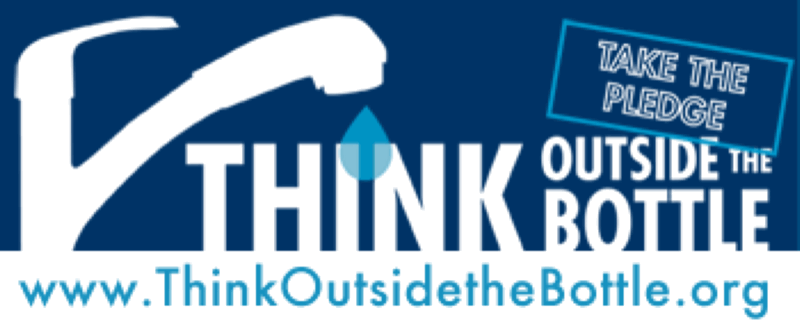
Click here to take the ThinkOutsidetheBottle.org pledge
Bottled water corporations are changing the very way people think about water. Though many bottled water brands come from the same source as public tap water, they are marketed as somehow more pure. What's more - bottled water corporations sell water back to the public at thousands of times the cost. Plastic bottles also require massive amounts of fossil fuels to manufacture and transport. Billions of these bottles wind up in landfills every year.
You can help reverse this trend. At events and over online networks thousands are supporting the efforts of local officials to reduce the environmental harm of bottled water by prioritizing public water systems. Taking the Think Outside the Bottle Pledge is quick, easy, and sends the message that water is a human right, not a commodity.
c. Click here for more on the Bottled Water Scam
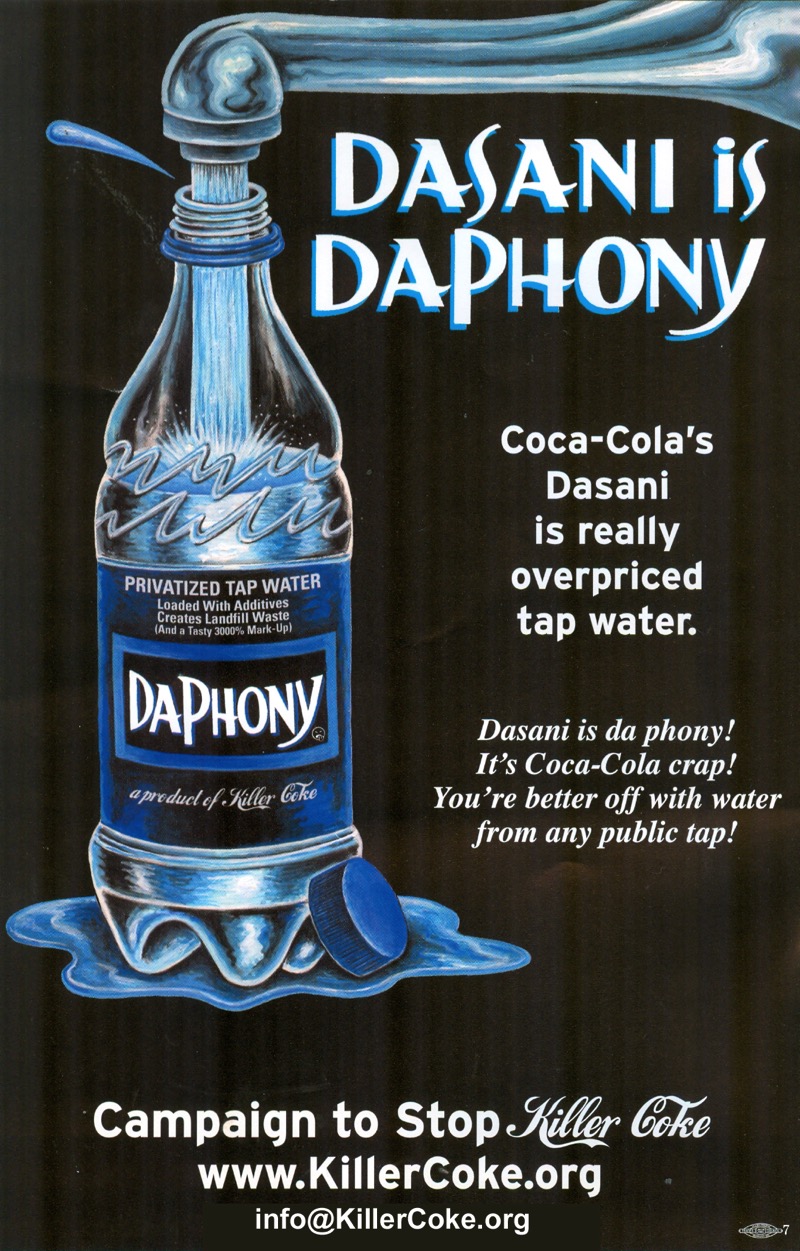
d. Center for Science in the Public Interest Press Release, "Groups Announce Global 'Dump Soda' Campaign," October 29, 2007
Read Article
"An international coalition of consumer organizations announced the formation of the Global 'Dump Soda' Campaign to call attention to the marketing of sugary soft drinks and other high calorie beverages linked to the world-wide childhood obesity crisis."
10. Major reports from the campaign that are useful in organizing
Critical Talking Points from the Campaign to Stop Killer Coke
Read the Critical Talking Points on Killer Coke
LABOR AND HUMAN RIGHTS: 'The Real Thing' in Colombia, By Lesley Gill
Read Report
Colombia Solidarity Campaign, "The Anti-Coke Manifesto," By Andy Higginbottom, Secretary, Colombia Solidarity Campaign
Read Manifesto
Read Manifesto in Italian
"Inside the Real Thing: Corporate profile on Coca-Cola Corporation," Report by the Polaris Institute (Canada)
Read the report in pdf format
NYC fact-finding delegation's report on human rights violations by Coke - Final Report, NYC Council Member Hiram Monserrate, April 2004
View Full Report in pdf - html
View Appendices
War on Want, Press Release and Report, "Coca-Cola under fire as World Cup comes to London, Released March 20, 2006
Read Release
Read Report, "Coca-Cola: The Alternative Report"
En Español
Seven Points to Settlement
Read the Seven Points.
"ILRF Director Terry Collingsworth Response to Coke's Denials," July 8, 2004
Read Response
"University of Michigan Falls Prey to Another Coca-Cola PR Scam," Campaign to Stop Killer Coke
April 17, 2006 Press Release/Report
WB11, New York Feature on the Campaign to Stop Killer Coke
On July 11, 2005, WB11, one of New York City area's major television stations aired a special "Fact Finders Report" on the Campaign to Stop Killer Coke called "Coca-Cola Faces Human Rights Violations." Interviewed are Campaign Director Ray Rogers, Hofstra University Campaign Activist Vanessa Cudabac, New York City Council Member Hiram Monserrate, New York City Comptroller William Thompson and American Postal Workers Union (APWU) Secretary-Treasurer Terry Stapleton. This excellent feature was watched by millions on WB11 and, as we found out from supporters, watched by others around the world on satellite television.
Play Tape of Show
The Campaign's Response to Coke's Statements on the WB11 Feature
Read Response
Video, "State of the Union," produced by Insight News for Channel 4 of Great Britain.
Watch State of the Union
11. Do you need a customized Campaign leaflet?
When we invited supporters to contact us to "customize a leaflet for your campus, union or group," the response was terrific! We immediately began getting emails asking us to produce customized leaflets for numerous colleges, universities, high schools and middle schools. We put them up as soon as we could. We have leaflets for Australia, Canada, Colombia (in Spanish), India, Ireland, Japan, the UK and the US.
Because the demand for flyers was so strong, it took up too much server space. We decided to leave the list online with the schools listed for which we have customized flyers. If you need a copy of your flyer, please contact us and we'll email it to you as soon as possible.
Look to see if your customized flyer is listed.
If your school, union or group is not listed and you would like a customized leaflet, please contact us at info@KillerCoke.org. Please state the name of your school and the name of the sponsoring group, if any, and a local email address, if you want us to put them into the flyer. If you want the flyer for a group, please state the name of the group and an email address. Also, whenever you email the Campaign to Stop Killer Coke, please include a phone number, if possible, in case we have a need to talk with you.
12. Campaign's 'Campus Activism' Section
Many students interested in launching a Campaign to Stop Killer Coke at their schools and colleges have been contacting us. We recommend that students begin by checking out the two organizing packets in our "Campus Activism" section:
- "Unthinkable! Undrinkable! A Campus Campaign Overview," a USAS Campus Guide
- Campus Activism Packet — Campaign for a Coca-Cola Free Campus
- Schools Active in the Campaign to Stop Killer Coke
In addition, there are numerous reports, resolutions and articles in the "Campus Activism" section that can be useful.
13. Take Actions Against Coke!
- Send an e-mail to Coke to protest their abuses in Colombia
- Call Coca-Cola and tell them to stop their worldwide abuses at 1-800-GET-COKE.
- Sign a Petition protesting Coke's abuses
- Join the Boycott at Karmabanque's web site at: www.karmabanque.com
- Send an E-Card to Coca-Cola
14. Please send photos, reports of events, etc. for the Campaign website
Please send photos, reports of events, and if you are in a school, union or organization that has banned Coke products, please send us the resolution or a description of how the decision was made. We would like the Campaign website to be up-to-date and to share the information via our newsletter. (Whenever you email us, please include your phone number and the best times to contact you, including weekends.)
Campaign to Stop KILLER COKE
We are seeking your help to stop a gruesome cycle of murders, kidnappings, and torture of union leaders and organizers involved in daily life-and-death struggles at Coca-Cola bottling plants in Colombia, South America.
"If we lose the fight against Coca-Cola, we will first lose our union, next our jobs and then our lives." SINALTRAINAL VIce President Juan Carlos Galvis
Please donate to the Campaign.
Learn the truth about The Coca-Cola Co.
"We believe the evidence shows that Coca-Cola and its corporate network are rife with immorality, corruption and complicity in murder."
Campaign to Stop Killer Coke/Corporate Campaign, Inc. Director Ray Rogers











